New Delhi – Defence Minister Rajnath Singh has taken an unprecedented step by refusing to endorse the joint statement at the recent SCO Summit, marking a significant diplomatic moment that has drawn international attention. The SCO Summit, held in Qingdao, China, from June 25-26, concluded without the customary unified declaration from participating nations due to India’s firm stance on addressing cross-border terrorism concerns.
Singh’s decision to withhold India’s signature at the SCO Summit represents a bold diplomatic move that underscores the nation’s unwavering commitment to combating terrorism. The defence minister’s refusal came after the proposed joint statement failed to adequately address India’s specific concerns regarding cross-border terrorist activities, particularly those emanating from Pakistan.
Cross-Border Terrorism Takes Center Stage
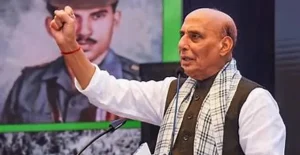

The primary reason behind India’s refusal to sign the SCO Summit joint statement centers on the document’s failure to explicitly address cross-border terrorism. Sources close to the matter revealed that the proposed statement lacked a clear-cut approach to combat terrorism, including specific measures against cross-border terror attacks that have plagued the region.
India’s position at the SCO Summit was strengthened by recent events, particularly the Pahalgam attack that claimed 26 lives on April 22. The defence minister used this tragic incident as a prime example of the ongoing terrorist threats facing the region, emphasizing the need for concrete action rather than diplomatic rhetoric.
The SCO Summit discussion highlighted India’s concerns about Pakistan’s continued support for terrorist organizations, specifically Lashkar-e-Taiba and its offshoot, The Resistance Front, which was allegedly behind the Pahalgam attack. Singh’s presentation at the SCO Summit drew clear connections between these groups and the pattern of terror attacks targeting Indian soil.
Operation Sindoor: India’s Decisive Response
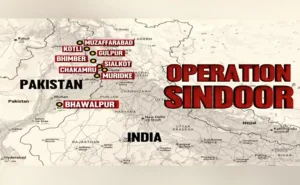
During his address at the SCO Summit, Rajnath Singh detailed India’s military response to the Pahalgam attack through ‘Operation Sindoor,’ which targeted terror camps and bases in Pakistan and Pakistan-occupied Kashmir. The operation demonstrated India’s resolve to take decisive action against terrorism, regardless of international boundaries.
The SCO Summit provided Singh with a platform to explain how Operation Sindoor instilled fear in the minds of terrorists and sent a clear message about India’s zero-tolerance policy toward terrorism. The military strike triggered a four-day standoff between India and Pakistan, showcasing the serious escalation that resulted from the terror attack.
Singh’s presentation at the SCO Summit emphasized that epicentres of terrorism are no longer safe and that India will not hesitate to target them when national security is threatened. This strong stance resonated throughout the defense ministers’ meeting, highlighting India’s commitment to protecting its citizens from terrorist threats.
Regional Security Challenges Addressed
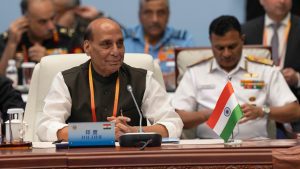

The SCO Summit brought together defense leaders from member states including India, China, Russia, and other Central Asian nations to discuss regional and international peace and security issues. Singh used this opportunity to outline the biggest challenges facing the region, identifying radicalisation, extremism, and terrorism as the root causes of peace and security deficits.
During his speech at the SCO Summit, the defence minister called for decisive action and unity among member nations in fighting these collective threats. He emphasized that dealing with terrorism requires a coordinated approach that eliminates double standards and ensures consistent action against all forms of extremism.
The SCO Summit discussions revealed the complex security landscape in the region, with India advocating for stronger measures against state-sponsored terrorism. Singh’s address highlighted the need for member nations to work together to reduce terrorism risks while maintaining their commitment to regional stability.
No Double Standards Policy
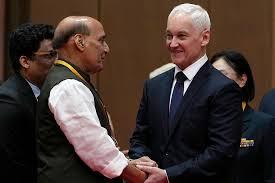

A key theme of India’s position at the SCO Summit was the principle of “no double standards” when combating terrorism. Singh’s emphasis on this principle reflected India’s frustration with what it perceives as selective approaches to addressing terrorist activities in the region.
The defence minister’s statement at the SCO Summit made it clear that terrorism cannot be categorized as good or bad based on political convenience. This position challenged other member nations to adopt consistent policies against all forms of terrorism, regardless of their political implications or regional dynamics.
India’s stance at the SCO Summit demonstrated its commitment to principled diplomacy, where national security concerns take precedence over diplomatic convenience. The refusal to sign the joint statement sent a strong message about India’s unwillingness to compromise on fundamental security issues.
Diplomatic Consequences and Regional Impact
The unprecedented conclusion of the SCO Summit without a joint statement marks a significant diplomatic development in regional cooperation. India’s decision to withhold its signature has highlighted the challenges facing multilateral cooperation when fundamental security concerns remain unaddressed.
The SCO Summit outcome reflects the broader tensions in South Asian security dynamics, particularly the India-Pakistan conflict and its impact on regional stability. Singh’s firm stance has potentially influenced future discussions within the Shanghai Cooperation Organisation regarding terrorism and security cooperation.
The absence of a joint statement from the SCO Summit may prompt member nations to reconsider their approaches to addressing terrorism and security concerns. India’s principled position could lead to more substantive discussions about concrete measures against cross-border terrorism in future meetings.
Looking Forward: Implications for Regional Security
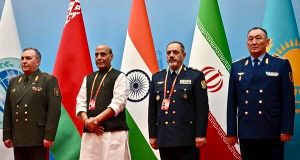

The SCO Summit’s conclusion without a unified statement represents a watershed moment in regional security cooperation. India’s refusal to endorse the joint statement has set a precedent for holding international organizations accountable for addressing legitimate security concerns.
The aftermath of this SCO Summit will likely influence future multilateral engagements, with member nations potentially adopting more specific language regarding terrorism and security threats. India’s position has demonstrated that meaningful cooperation requires addressing fundamental concerns rather than maintaining diplomatic appearances.
As regional security challenges continue to evolve, the SCO Summit outcome serves as a reminder that effective multilateral cooperation must address core issues that affect member nations’ security and stability. India’s stance reflects a broader trend toward more assertive diplomacy in addressing terrorism and regional security concerns.

